Whilst I managed to read just over fifty books in 2017 (down from sixty in 2016) here are ten of my favourites, in no particular order.
Disappointments this year included Doug Stanhope's This Is Not Fame, a barely coherent collection of bar stories that felt especially weak after Digging Up Mother, but I might still listen to the audiobook as I would enjoy his extemporisation on a phone book. Ready Player One left me feeling contemptuous, as did Charles Stross' The Atrocity Archives.
The worst book I finished this year was Adam Mitzner's Dead Certain, beating Dan Brown's Origin, a poor Barcelona tourist guide at best.
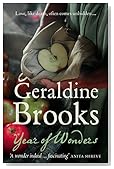
Geraldine Brooks
Teased by Hilary Mantel's BBC Reith Lecture appearances and not content with her short story collection, I looked to others for my fill of historical fiction whilst awaiting the final chapter in the Wolf Hall trilogy.
This book, Year of Wonders, subtitled A Novel of the Plague, is written from point of view of Anna Frith, recounting what she and her Derbyshire village experience when they nobly quarantine themselves in order to prevent the disease from spreading further.
I found it initially difficult to get to grips with the artificially aged vocabulary — and I hate to be "that guy" — but do persist until the chapter where Anna takes over the village apothecary.
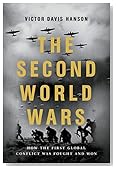
Victor Davis Hanson
If the pluralisation of "Wars" is an affectation, it certainly is an accurate one: whilst we might consider the Second World War to be a unified conflict today, Hanson reasonably points out that this is a post hoc simplification of different conflicts from the late-1910s through 1945.
Unlike most books that attempt to cover the entirety of the war, this book is organised by topic instead of chronology. For example, there are two or three adjacent chapters comparing and contrasting naval strategy before moving onto land armies, constrasting and comparing Germany's eastern and western fronts, etc. This approach leads to a readable and surprisingly gripping book despite its lengthy 720 pages.
Particular attention is given to the interplay between the various armed services and how this tended to lead to overall strategic victory. This, as well as the economics of materiel, simple rates-of-replacement, combined with the irrationality and caprice of the Axis would be an fair summary of the author's general thesis — this is no Churchill, Hitler & The Unnecessary War.
Hanson is not afraid to ask "what if" questions but only where they provide meaningful explanation or provide deeper rationale rather than as an indulgent flight of fancy. His answers to such questions are invariably that some outcome would have come about.
Whilst the author is a US citizen, he does not spare his homeland from criticism, but where Hanson's background as classical-era historian lets him down is in contrived comparisons to the Peloponnesian War and other ancient conflicts. His Napoleonic references do not feel as forced, especially due to Hitler's own obsessions. Recommended.
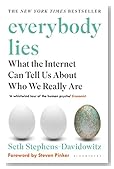
Seth Stephens-Davidowitz
Vying for the role as the Freakonomics for the "Big Data" generation, Everybody Lies is essentially a compendium of counter-arguments, refuting commonly-held beliefs about the internet and society in general based on large-scale observations. For example:
Google searches reflecting anxiety—such as "anxiety symptoms" or "anxiety help"—tend to be higher in places with lower levels of education, lower median incomes and where a larger portion of the population lives in rural areas. There are higher search rates for anxiety in rural, upstate New York than in New York City.
Or:
On weekends with a popular violent movie when millions of Americans were exposed to images of men killing other men, crime dropped. Significantly.
Some methodological anecdotes are included: a correlation was once noticed between teens being adopted and the use of drugs and skipping school. Subsequent research found this correlation was explained entirely by the 20% of the self-reported adoptees not actually being adopted...
Although replete with the kind of factoids that force you announce them out loud to anyone "lucky" enough to be in the same room as you, Everybody Lies is let down by a chronic lack of structure — a final conclusion that is so self-aware of its limitations that it ready and repeatedly admits to it is still an weak conclusion.
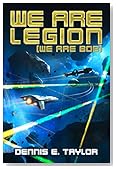
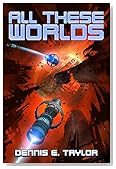
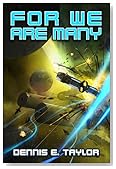
Dennis Taylor
I'm really not a "science fiction" person, at least not in the sense of reading books catalogued as such, with all their indulgent meta-references and stereotypical cover art.
However, I was really taken by the conceit and execution of the Bobiverse trilogy: Robert "Bob" Johansson perishes in an automobile accident the day after agreeing to have his head cryogenically frozen upon death. 117 years later he finds that he has been installed in a computer as an artificial intelligence. He subsequently clones himself multiple times resulting in the chapters being written from various "Bob's" locations, timelines and perspectives around the galaxy.
One particular thing I liked about the books was their complete disregard for a film tie-in; Ready Player One was almost cynically written with this in mind, but the Bobiverse cheerfully handicaps itself by including Homer Simpson and other unlicensable characters.
Whilst the opening world-building book is the most immediately rewarding, the series kicks into gear after this — as the various "Bob's" unfold with differing interests (exploration, warfare, pure science, anthropology, etc.) a engrossing tapestry is woven together with a generous helping of humour and, funnily enough, believability.

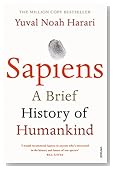
Homo Deus: A Brief History of Tomorrow
Yuval Noah Harari
After a number of strong recommendations I finally read Sapiens, this book's prequel.
I was gripped, especially given its revisionist insight into various stages of Man. The idea that wheat domesticated us (and not the other way around) and how adoption of this crop led to truncated and unhealthier lifespans particularly intrigued me: we have an innate bias towards chronocentrism, so to be reminded that progress isn't a linear progression from "bad" to "better" is always useful.
The sequel, Homo Deus, continues this trend by discussing the future potential of our species. I was surprised just how humourous the book was in places. For example, here is Harari on the anthropocentric nature of religion:
You could never convince a monkey to give you a banana by promising him limitless bananas after death in monkey heaven.
Or even:
You can't settle the Greek debt crisis by inviting Greek politicians and German bankers to a fist fight or an orgy.
The chapters on AI and the inexpensive remarks about the impact of social media did not score many points with me, but I certainly preferred the latter book in that the author takes more risks with his own opinion so it's less dry and more more thought-provoking, even if one disagrees.
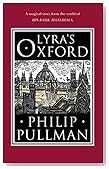
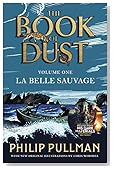
La Belle Sauvage: The Book of Dust Volume One
Philip Pullman
I have extremely fond memories of reading (and re-reading, etc.) the author's Dark Materials as a teenager despite being started on the second book by a "supply" English teacher.
La Belle Sauvage is a prequel to this original trilogy and the first of another trio. Ms Lyra Belacqua is present as a baby but the protagonist here is Malcolm Polstead who is very much part of the Oxford "town" rather than "gown".
Alas, Pullman didn't make a study of Star Wars and thus relies a little too much on the existing canon, wary to add new, original features. This results in an excess of Magesterium and Mrs Coulter (a superior Delores Umbridge, by the way), and the protagonist is a little too redolent of Will...
There is also an very out-of-character chapter where the magical rules of the novel temporarily multiply resulting in a confusion that was almost certainly not the author's intention. You'll spot it when you get to it, which you should.
(I also enjoyed the slender Lyra's Oxford, essentially a short story set just a few years after The Amber Spyglass.)
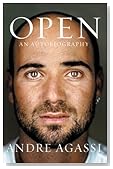
Andre Agassi
Sporting personalities certainly exist, but they are rarely revealed by their "authors" so upon friends' enquiries to what I was reading I frequently caught myself qualifying my response with «It's a sports autobiography, but...».
It's naturally difficult to know what we can credit to Agassi or his (truly excellent) ghostwriter but this book is a real pleasure to read. This is no lost Nabokov or Proust, but the level of wordsmithing went beyond supererogatory. For example:
For a man with so many fleeting identities, it's shocking, and symbolic, that my initials are A. K. A.
Or:
I understand that there's a tax on everything in America. Now, I discover that this is the tax on success in sports: fifteen seconds of time for every fan.
Like all good books that revolve around a subject, readers do not need to know or have any real interest in the topic at hand, so even non-tennis fans will find this an engrossing read. Dark themes abound — Agassi is deeply haunted by his father, a topic I wish he went into more, but perhaps he has not done the "work" himself yet.
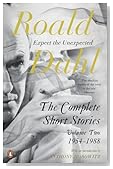
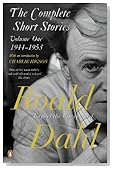
Roald Dahl
I distinctly remember reading Roald Dahl's The Wonderful Story of Henry Sugar and Six More collection of short stories as a child, some characters still etched in my mind; the 'od carrier and fingersmith of The Hitchhiker or the protagonist polishing his silver Trove in The Mildenhall Treasure.
Instead of re-reading this collection I embarked on reading his complete short stories, curious whether the rest of his œuvre was at the same level. After reading two entire volumes, I can say it mostly does — Dahl's typical humour and descriptive style are present throughout with only a few show-off sentences such as:
"There's a trick that nearly every writer uses of inserting at least one long obscure word into each story. This makes the reader think that the man is very wise and clever. I have a whole stack of long words stored away just for this purpose." "Where?" "In the 'word-memory' section," he said, epexegetically.
There were a perhaps too many of his early, mostly-factual, war tales that were lacking a an interesting conceit and I still might recommend the Henry Sugar collection for the uninitiated, but I would still heartily recommend either of these two volumes, starting with the second.
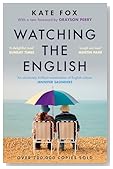
Kate Fox
Written by a social anthropologist, this book dissects "English" behaviour for the layman providing an insight into British humour, rites of passage, dress/language codes, amongst others.
A must-read for anyone who is in — or considering... — a relationship with an Englishman, it is also a curious read for the native Brit: a kind of horoscope for folks, like me, who believe they are above them.
It's not perfect: Fox tediously repeats that her "rules" or patterns are not rules in the strict sense of being observed by 100% of the population; there will always be people who do not, as well as others whose defiance of a so-called "rule" only reinforces the concept. Most likely this reiteration is to sidestep wearisome criticisms but it becomes ponderous and patronising over time.
Her general conclusions (that the English are repressed, risk-averse and, above all, hypocrites) invariably oversimplify, but taken as a series of vignettes rather than a scientifically accurate and coherent whole, the book is worth your investment.
(Ensure you locate the "revised" edition — it not only contains more content, it also profers valuable counter-arguments to rebuttals Fox received since the original publication.)
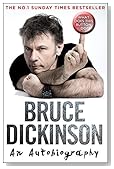
Bruce Dickinson
In this entertaining autobiography we are thankfully spared a litany of Iron Maiden gigs, successes and reproaches of the inevitable bust-ups and are instead treated to an introspective insight into just another "everyman" who could very easily be your regular drinking buddy if it weren't for a need to fulfill a relentless inner drive for... well, just about anything.
The frontman's antics as a schoolboy stand out, as are his later sojourns into Olympic fencing and being a commercial pilot. These latter exploits sound bizarre out of context but despite their non-sequitur nature they make a perfect foil (hah!) to the heavy metal.
A big follower of Maiden in my teens, I fell off the wagon as I didn't care for their newer albums so I was blindsided by Dickinson's sobering cancer diagnosis in the closing chapters. Furthermore, whilst Bruce's book fails George Orwell's test that autobiography is only to be trusted when it reveals something disgraceful, it is tour de force enough for to distract from any concept of integrity.
(I have it on excellent authority that the audiobook, which is narrated by the author, is definitely worth one's time.)
